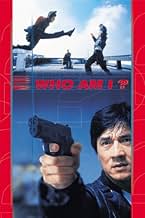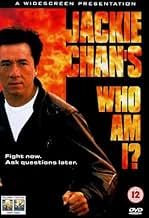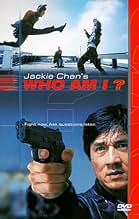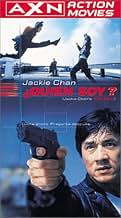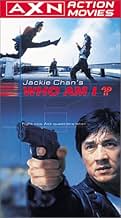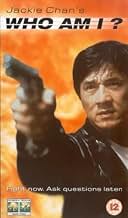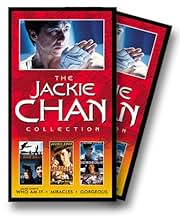अपनी भाषा में प्लॉट जोड़ेंA Secret Agent loses his memory after falling from a crashing helicopter. He is then chased by several other agency operatives, but he has no idea why.A Secret Agent loses his memory after falling from a crashing helicopter. He is then chased by several other agency operatives, but he has no idea why.A Secret Agent loses his memory after falling from a crashing helicopter. He is then chased by several other agency operatives, but he has no idea why.
- निर्देशक
- लेखक
- स्टार
- पुरस्कार
- 2 जीत और कुल 10 नामांकन
Ton Pompert
- CIA Chairman
- (as Tom Pompert)
Glory Simon
- CIA Secretary
- (as Gloria Simon)
Fred van Ditmarsch
- Airforce
- (as Johan van Ditmarsch)
Jeremiah Fleming
- Marine Assistant
- (as Jeremiah Flemming)
फ़ीचर्ड समीक्षाएं
Jackie Chan plays a "special forces" agent in this action/adventure film that is as concerned with spoofing the genre as it is with embracing it. The film starts with Chan and fellow agents descending on a convoy through the "South African jungle" to abscond a handful of scientists who have been working on exploiting unusual properties of a mineral found in the South African mines. With the aid of extensive training and sophisticated technological gadgetry, they complete their mission successfully. But someone in the "squad" is double crossing them. As the men are headed for recreational leave, they're sabotaged. Chan makes it out alive, but barely. He hits his head and acquires amnesia. The bulk of the film has him coping with his situation--he first ends up in the middle of a traditional South African community--while government agents try to track him down and kill him.
There are some details I could not fill in above, because the primary flaw with the film, and this is what brought my score down to an 8, or a "B", rather than a 9 or 10, is that the story is almost absurdly convoluted and difficult to glean (there was also a fair amount of ridiculous English dubbing in the version I saw--it was difficult to tell how intentional the "problems" with the dubbing may have been). But the story isn't really the point; and to the extent that it is, the point may be to make it absurdly convoluted and difficult to glean--this is to a large extent a spoof, after all. More important, the story propels the film from one jaw dropping, action-filled set piece to the next. On a surface level, at least, those set pieces are the raison d'etre of Who Am I. But surprisingly perhaps, Chan, who co-directed and co-wrote the film in addition to starring in it, also has a lot of interesting subtextual things to say.
Most viewers will come to this film as Chan fans. As such, they'll be hoping to see his "trademark" martial arts abilities, impressive stunt work and notorious sense of humor; they will not leave disappointed. During the climax, Who Am I has one of the longer extended martial arts sequences in any Chan film, and it unexpectedly gets back to the basics. For at least ten minutes, Chan fights just two "big baddies" who are close matches in skill. He uses relatively few props and relies very little on moving about his environment in fancy ways.
Of course, there are plenty of props and a lot of well-choreographed, complicated blocking elsewhere. A few of these more ostentatious scenes are intentionally hilarious in their absurdity. One of the most memorable spoof scenes involves an extended car chase. Chan imports physics from an alternate universe for about half of this sequence.
As an adventure film, Who Am I presents a kind of James Bond-like travelogue. We go from the jungles of Malaysia (doubling as South Africa) to the South African plains (where Chan disguises himself as a tribesman) to Namibia for a cross-country 4 x 4 race (partially across what looks like the Etosha Pan) to the Netherlands. Those familiar with South Africa will find it amusing that during one sequence, Chan and the cohorts he picks up along the way travel from the Sun City's Lost City to downtown Johannesburg to Pretoria in a matter of minutes. But this is the movies, after all, and a fantastical work of fiction at that. The varied environments were very well chosen, providing a lot of eye candy while also providing great fodder for comic and action scenes.
While it's funny that Chan's character (who is referred to as "Jackie Chan" at one point) comes to be known as "Whoami" once amnesia sets in, there is much more intended than a silly comic device. It's significant that the film is set in South Africa, a nation with a complicated multicultural history and not a little turmoil over the same. The title isn't just a reference to amnesia or Chan's character; it's a rhetorical question about cultural and ethnic identity. The members of Chan's special forces squadron were all loaded with different passports from different countries. They were told to forget their identities. It's never clear who they were, where they came from or who they were working for--a point is made to not let the audience know, and to not even let us know whether they were "good guys" or not.
Chan has to fit into tribal culture. He becomes associated with a Chinese race team in or near Namibia, and then befriends a reporter who appears half Asian and half Caucasian. The American CIA is prominent in the film. They have their hands in every culture shown in the film. There are subtexts about globalism and how first world technology is affecting the development of non-first world countries. The ease of travel, symbolizing ethnic mobility, is a prominent theme. Chan makes sure that the film ends in the Netherlands, which has had a strong presence and influence in South Africa for hundreds of years. The villainy in the film is centered on building better weapons, which of course tend to be used to annihilate persons from opposing cultures or ethnicities. Cultural and ethnic identity has become far more complex in the last couple centuries than it ever was before, even if it was never the clear issue that many people around the world assume it to be.
That the film is able to bring up such interesting issues, all while awing us with graceful action sequences and making us laugh, makes Who Am I a very enjoyable experience. Chan fans shouldn't miss this one.
There are some details I could not fill in above, because the primary flaw with the film, and this is what brought my score down to an 8, or a "B", rather than a 9 or 10, is that the story is almost absurdly convoluted and difficult to glean (there was also a fair amount of ridiculous English dubbing in the version I saw--it was difficult to tell how intentional the "problems" with the dubbing may have been). But the story isn't really the point; and to the extent that it is, the point may be to make it absurdly convoluted and difficult to glean--this is to a large extent a spoof, after all. More important, the story propels the film from one jaw dropping, action-filled set piece to the next. On a surface level, at least, those set pieces are the raison d'etre of Who Am I. But surprisingly perhaps, Chan, who co-directed and co-wrote the film in addition to starring in it, also has a lot of interesting subtextual things to say.
Most viewers will come to this film as Chan fans. As such, they'll be hoping to see his "trademark" martial arts abilities, impressive stunt work and notorious sense of humor; they will not leave disappointed. During the climax, Who Am I has one of the longer extended martial arts sequences in any Chan film, and it unexpectedly gets back to the basics. For at least ten minutes, Chan fights just two "big baddies" who are close matches in skill. He uses relatively few props and relies very little on moving about his environment in fancy ways.
Of course, there are plenty of props and a lot of well-choreographed, complicated blocking elsewhere. A few of these more ostentatious scenes are intentionally hilarious in their absurdity. One of the most memorable spoof scenes involves an extended car chase. Chan imports physics from an alternate universe for about half of this sequence.
As an adventure film, Who Am I presents a kind of James Bond-like travelogue. We go from the jungles of Malaysia (doubling as South Africa) to the South African plains (where Chan disguises himself as a tribesman) to Namibia for a cross-country 4 x 4 race (partially across what looks like the Etosha Pan) to the Netherlands. Those familiar with South Africa will find it amusing that during one sequence, Chan and the cohorts he picks up along the way travel from the Sun City's Lost City to downtown Johannesburg to Pretoria in a matter of minutes. But this is the movies, after all, and a fantastical work of fiction at that. The varied environments were very well chosen, providing a lot of eye candy while also providing great fodder for comic and action scenes.
While it's funny that Chan's character (who is referred to as "Jackie Chan" at one point) comes to be known as "Whoami" once amnesia sets in, there is much more intended than a silly comic device. It's significant that the film is set in South Africa, a nation with a complicated multicultural history and not a little turmoil over the same. The title isn't just a reference to amnesia or Chan's character; it's a rhetorical question about cultural and ethnic identity. The members of Chan's special forces squadron were all loaded with different passports from different countries. They were told to forget their identities. It's never clear who they were, where they came from or who they were working for--a point is made to not let the audience know, and to not even let us know whether they were "good guys" or not.
Chan has to fit into tribal culture. He becomes associated with a Chinese race team in or near Namibia, and then befriends a reporter who appears half Asian and half Caucasian. The American CIA is prominent in the film. They have their hands in every culture shown in the film. There are subtexts about globalism and how first world technology is affecting the development of non-first world countries. The ease of travel, symbolizing ethnic mobility, is a prominent theme. Chan makes sure that the film ends in the Netherlands, which has had a strong presence and influence in South Africa for hundreds of years. The villainy in the film is centered on building better weapons, which of course tend to be used to annihilate persons from opposing cultures or ethnicities. Cultural and ethnic identity has become far more complex in the last couple centuries than it ever was before, even if it was never the clear issue that many people around the world assume it to be.
That the film is able to bring up such interesting issues, all while awing us with graceful action sequences and making us laugh, makes Who Am I a very enjoyable experience. Chan fans shouldn't miss this one.
This overlong Jackie vehicle looks like a DTV flick (of course it WAS a DTV flick, but that's no excuse), has an exposition-heavy script, and some of the action set-pieces (including the car chase) lack energy, but all's forgiven when we get to the last 20 minutes, where we witness one of the most exhilarating fight sequences ever filmed, followed shortly afterwards by (arguably) THE most breathtaking stunt Chan has ever attempted on-screen - and that's saying something! (**1/2)
ok, so the acting wasn't the greatest, but the excellence in every other aspect of the movie completely compensated for it. It had a good story, amazing action sequences, and a good combination of action and comedy (what Jackie does so well). the fight scene on top of the building is the best fight scene i've ever seen. what makes it the best is how real it is, today's movies' fight scenes are full of wires and quick cuts in editing to confuse the audience into thinking there's more going on. this fight had amazing stunts with guys who really knew what they were doing, with Jackie's trademark funny expressions mixed in. By far JC's best, and I didn't even say anything about the car stunts.
I'm astonished that there were so many negative reviews here...
This film is OBVIOUSLY not meant to be taken seriously. It is very clearly intentionally a "joke" of a film. That people would complain about bad acting, strange dubbing, and/or a convoluted plot just leaves me flabbergasted.
From the very beginning, it should be evident that a big part of the point of the film is its own self-deprecating humor. Jackie loses his memory and is picked up by a primitive African tribe. The chief asks him, in an unintelligible language, "Where do you come from? What is your name?" to which Jackie replies (not understanding the questions) "What am I doing here? Who am I?" This is a JOKE, folks.
A few minutes later, Jackie saves a snake-bite victim with an IV he improvises from a COCONUT! When he's returned to "civilization," the doctor is impressed with that tactic, saying, "That coconut IV technique is only used by elite military units!" Is there any way to even dream of taking the plot/dialogue seriously at this point?
The acting is "bad" by design. The actors were obviously told to ham up everything they did. The meeting of the American intelligence officials is a completely ironic reference to the same sort of scene you'd expect in any James Bond movie. Dialogue is intentionally absurd, plot developments are intentionally obvious. The "Morgan" character is played perfectly (and hilariously) as a crooked CIA operative out for his own gain while feigning loyalty to the USA.
Yuki is a master stunt-driver with the naivete and wide-eyed innocence of a schoolgirl. Christine Stark is a completely laughable "reporter" who fools Jackie only as a result of his head injury; after she's "exposed," she rescues Jackie in an golf cart that can't seem to move faster than an electric wheelchair.
That the villains actually join each other in a verse of song ("Friendship, friendship!") near the end should serve as a good reminder of just how camp this picture strives to be. To criticize it for this as a "failing" seems to me to profoundly miss the point. Did the same viewers dislike that "Hot Shots: Part Deux" was absurd too?
Overall, the strengths of the film deserve the attention: it is a very funny parody of the overplotted "action/intrigue" genre, it has a terrific car chase, notable action sequences, and a terrific Jackie-Chan-Style fight scene at the beginning of the film's climax.
Perhaps I enjoyed this movie because I had grown up watching the "GI Joe" cartoon series, and had always been rather insulted by the fact that it managed to be both preachy and stupid at the same time. If you're looking for a great 100 minutes of parody and HUMOR, I'd recommend this movie. If you're more interested in believability and suspending your disbelief, this film will definitely not work for you at all. Inappropriate expectations would be the only "problem" I can imagine that would reduce one's enjoyment of this film.
If you want a more serious Jackie Chan film, you might try Drunken Master II, or Police Story. But if you're looking for an enjoyable and sardonic 100 minutes, this is truly one of Jackie's great vehicles.
This film is OBVIOUSLY not meant to be taken seriously. It is very clearly intentionally a "joke" of a film. That people would complain about bad acting, strange dubbing, and/or a convoluted plot just leaves me flabbergasted.
From the very beginning, it should be evident that a big part of the point of the film is its own self-deprecating humor. Jackie loses his memory and is picked up by a primitive African tribe. The chief asks him, in an unintelligible language, "Where do you come from? What is your name?" to which Jackie replies (not understanding the questions) "What am I doing here? Who am I?" This is a JOKE, folks.
A few minutes later, Jackie saves a snake-bite victim with an IV he improvises from a COCONUT! When he's returned to "civilization," the doctor is impressed with that tactic, saying, "That coconut IV technique is only used by elite military units!" Is there any way to even dream of taking the plot/dialogue seriously at this point?
The acting is "bad" by design. The actors were obviously told to ham up everything they did. The meeting of the American intelligence officials is a completely ironic reference to the same sort of scene you'd expect in any James Bond movie. Dialogue is intentionally absurd, plot developments are intentionally obvious. The "Morgan" character is played perfectly (and hilariously) as a crooked CIA operative out for his own gain while feigning loyalty to the USA.
Yuki is a master stunt-driver with the naivete and wide-eyed innocence of a schoolgirl. Christine Stark is a completely laughable "reporter" who fools Jackie only as a result of his head injury; after she's "exposed," she rescues Jackie in an golf cart that can't seem to move faster than an electric wheelchair.
That the villains actually join each other in a verse of song ("Friendship, friendship!") near the end should serve as a good reminder of just how camp this picture strives to be. To criticize it for this as a "failing" seems to me to profoundly miss the point. Did the same viewers dislike that "Hot Shots: Part Deux" was absurd too?
Overall, the strengths of the film deserve the attention: it is a very funny parody of the overplotted "action/intrigue" genre, it has a terrific car chase, notable action sequences, and a terrific Jackie-Chan-Style fight scene at the beginning of the film's climax.
Perhaps I enjoyed this movie because I had grown up watching the "GI Joe" cartoon series, and had always been rather insulted by the fact that it managed to be both preachy and stupid at the same time. If you're looking for a great 100 minutes of parody and HUMOR, I'd recommend this movie. If you're more interested in believability and suspending your disbelief, this film will definitely not work for you at all. Inappropriate expectations would be the only "problem" I can imagine that would reduce one's enjoyment of this film.
If you want a more serious Jackie Chan film, you might try Drunken Master II, or Police Story. But if you're looking for an enjoyable and sardonic 100 minutes, this is truly one of Jackie's great vehicles.
Some of the most exciting action movies came out in the 90's, and this espionage gem is no exception, as it keeps you engaged from start to finish with its death-defying stunts - all of which don't feel as forced as they do in other Jackie Chan action flicks - and intriguing blend of humor, drama, and suspense. Taking place across a variety of locations (including South Africa), it's an adventurous epic that gives you a lot to see. The plot also unfolds primarily as a mystery, keeping you guessing to the end, as Jackie is trying to find out exactly why everyone from the secret police to the CIA is after him. Like most Jackie Chan films, there's also a strong reliance on humor, except this film doesn't have nearly as much slapstick as, say, "Police Story", to the point where it becomes annoying. The humor is carefully blended into the proceedings, and even when it reaches unintentional levels, it somehow makes the movie all the more enjoyable.
I won't spoil the various stunts performed in the film, you just have to see them to believe them, but needless to say, they are jaw-dropping. Speaking of jaw-dropping, the rooftop fight, which also serves as the final fight sequence in the film, is one of the best I've ever seen. It goes on for a while, but it's so well choreographed and stunningly executed that you'll want it to keep going for a few more minutes afterwards. The score by Nathan Wang, while nothing remarkable, fits the movie well, and sometimes goes so far as to raise the excitement factor, specifically during the chase sequences. It must be hard for anybody to direct themselves in a film, especially in an action film on such a large scale as this one, but Jackie Chan does so admirably here, alongside Benny Chan. It's some of his best work of the 90's alongside "Operation Condor".
I won't spoil the various stunts performed in the film, you just have to see them to believe them, but needless to say, they are jaw-dropping. Speaking of jaw-dropping, the rooftop fight, which also serves as the final fight sequence in the film, is one of the best I've ever seen. It goes on for a while, but it's so well choreographed and stunningly executed that you'll want it to keep going for a few more minutes afterwards. The score by Nathan Wang, while nothing remarkable, fits the movie well, and sometimes goes so far as to raise the excitement factor, specifically during the chase sequences. It must be hard for anybody to direct themselves in a film, especially in an action film on such a large scale as this one, but Jackie Chan does so admirably here, alongside Benny Chan. It's some of his best work of the 90's alongside "Operation Condor".
क्या आपको पता है
- ट्रिवियाMichelle Ferre never considered acting, but on the set of this movie, when she tried to interview Jackie Chan, he was struck by her, and asked her to audition for the movie, which she did, and landed a co-starring role.
- गूफ़When Jacki runs up the hill on top of the rocks and screams, "Who am I?" you can see a member of the crew underneath the bridge area. When the chopper shot starts to move around you can see him look up at the camera and move back under the bridge trying to hide.
- भाव
Morgan's hitman: You've got two choices. Give us the disk and jump off.
Morgan's Hitman: Or number two, we take the disk and throw you off.
Who Am I?: I like the third choice: I keep the disk, and I throw you both off.
- क्रेज़ी क्रेडिटIn the tradition of every Jackie Chan film, outtakes appear under the end credits. All of Jackie's outtakes involve bloopers only. The only injury on the outtakes is a stunt driver being brought out on a stretcher.
- इसके अलावा अन्य वर्जनThe American version is cut by 9 minutes. Scenes omitted from the American version: -In the Hong Kong version, we do not see Jackie's unit get double crossed right after the mission is over (The American edit shows the unit getting double crossed after the mission). When the mission is over, it immediately cuts to the CIA briefing room. The scene with the double cross is shown during a flashback.
- There are more scenes with Jackie and his time with the African tribe. These include:
- Jackie talks in Chinese most of the time (The American version shows him talking in English as the film was shot in English).
- A conversation with tribal child Baba about the sun and the moon in hopes of finding out what happened to him.
- A confrontation with Jackie and a lion after Jackie picks up one of the lion's cubs.
- A ceremony where Jackie is made a member of the tribe.
- Before he leaves his tribal friends to go journey to find out his true identity, he does a traditional tribal dance for them and they return the favor with a dance of their own.
- कनेक्शनFeatured in Jackie Chan: My Story (1998)
- साउंडट्रैकYa Kuo Hu Di Ren (A Man in the Past)
Written by Lam Si
Performed by Emil Chow Wah-Kin
टॉप पसंद
रेटिंग देने के लिए साइन-इन करें और वैयक्तिकृत सुझावों के लिए वॉचलिस्ट करें
विवरण
- चलने की अवधि2 घंटे
- रंग
- ध्वनि मिश्रण
- पक्ष अनुपात
- 2.35 : 1
इस पेज में योगदान दें
किसी बदलाव का सुझाव दें या अनुपलब्ध कॉन्टेंट जोड़ें



